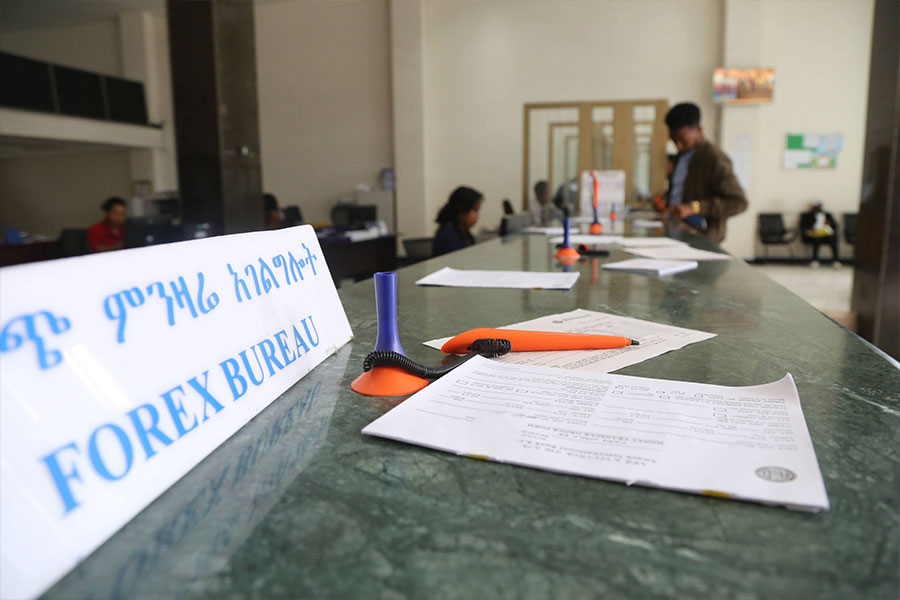
Radar | Oct 20,2024
Aklilu Ayenew, born in Wolaita Sodo and in his mid-20s, has been selling consumable products at his spot located near the National Theatre on Gambia Street.
Working as a street vendor of biscuits, gum, candy and mobile cards for almost a year, Aklilu earns nearly 100 Br a day on average.
Aklilu had never ventured to open a bank account in his name, convinced that he had to have a high income to approach the banks and start saving his money.
Things changed around three months ago when an employee of the state-owned giant Commercial Bank of Ethiopia (CBE) approached him to open a savings account.
"He encouraged me to open an account and save whatever I earn each day," Aklilu told Fortune.
Once he agreed to open an account, the bank provided him with Muday, a wooden savings box embossed with the Bank’s logo and markings.
The Mudaybank service, which is limited to low-income earners, is designed to facilitate daily savings to be collected prior to being deposited. The Bank retains the key to the boxes at branches where employees will open them and make the deposits directly into the savings accounts of customers. The Bank requires that its Muday- a term that refers to traditional hand-woven, coloured straw boxes - customers make deposits every two weeks at their branches.
Aklilu has been pulling 20 Br to 30 Br into the box each day, depending on his earnings, and takes the box to the bank twice a month to make his deposits. He hopes that his savings will one day change his life by accumulating capital.
The savings program is relatively new and has been adopted by some other banks to promote saving among street vendors and small traders.
Bank of Abyssinia, Dashen Bank, Cooperative Bank of Oromia and Wegagen Bank are among the other institutions that have forayed to attract this atypical banking customer base.
One of the small traders, Akelilu Ayanew, is showing a savings-box that the Commercial Bank provides to encourage street vendors to start saving portions of the daily earnings.
The banks started the service after watching how street vendors use improvised saving mechanisms that are common among small traders on side markets throughout the city.
Wegagen Bank, one of the 16 private commercial banks, is among those who entered the venture about two years ago.
One of the regional branches of Wegagen, Jiima Gibe, started the service and has mobilised nearly 2.5 million Br in deposits from small traders.
In the last six months, Wegagen has been providing Mudayto street vendors free of charge.
"We spend 400 Br to procure each Muday, which has our logo stamped on it," Fikiru Woldetensie, director of marketing and corporate communications of Wegagen, said.
Wegagen gives the Mudayto street vendors to save their petty cash, time, transport costs and the inconveniences of going to the branches, according to Fikiru.
Some other banks also go to the doors of these businesses to collect their savings every month.
Hana Woldeyes, a street vendor at Sisay Meda market in Cherkos, is one of the beneficiaries of this service. Last year, she opened a savings account under this scheme at Cooperative Bank of Oromia.
To date, she has saved 4,000 Br.
"Beyond having a saving habit, it helped me in making my life easier and to concentrate only on my business," Hana told Fortune.
Tewodros Abay, a businessman in his mid-30s, shares Hana's view and experience. He makes his living selling spare parts for electrical equipment.
He has been saving up to 60 Br a day in bank deposits over the last two years, holding in his account nearly 7,000 Br. There are also some days when he saves nothing depending on his business flow.
He applauds the marketing strategy and services of the banks and claims that Dashen Bank employees come around to collect the deposits every two days.
“This saving approach makes my life easier, because I wouldn’t go to the bank to save a small amount of money; rather the money collectors come to us to collect the money," he said. "This helps me to save money and time as well as focus on my business."
Commercial Bank of Ethiopia, which started the service in November 2014, is using the scheme as a way of mobilising massive deposits, according to the Bank.
By the end of the second edition of the Growth & Transformation Plan (GTP II), the government has targeted to mobilise 10 trillion Br in resources.
Both the state and private commercial banks have together mobilized 730.3 billion Br in deposits aided by branch expansion, reflecting a 28.4pc annual growth rate.
For the deposits, the banks have pay an eight percent average interest rate on savings deposits.
"We use the scheme as one of the ways to execute this agenda of the government," said Blen Hailu, public relations manager at CBE.
Since the scheme was started half a decade ago, CBE has managed to get 290,000 account holders, who are street vendors and market keepers, who conduct their trades across streets, the countryside and rural areas, cities, metropolises and in big open markets like Merkato.
This segment of the Bank’s customers is made up of small traders, semi-skilled workers, small holder farmers, shoe shiners, and other individuals engaged in small businesses with little or no opportunity to save money.
The 18 banks and 35 microfinance institutions in the country together have 30.7 million accounts, which accounts for a 22pc adult banked population - 14 percentage points lower than the sub-Saharan African average.
The street vendors have accepted and welcomed the program, according to Blen. She also asserts that the bank gives different support to street vendors, including awareness creation on features and benefits of Mudaybank service, encouraging them to save petty cash or coins regardless of the amount.
"Aside from achieving government policies in an enhancement of public saving culture indicated in the GTP II," says Blen, "The Bank will benefit with market outreach, financial inclusion, attitudinal transformation and competitive advantage."
“As of June 2018, the CBE has mobilised 1.7 billion Br in the scheme,” says Blen.
Even though the Bank managed to widen the account holder base and mobilised massive resources, the Bank is providing service with some challenge, according to Blen.
There are customers who use the boxes inappropriately or lose the boxes to theft and damage. Some customers also suffer from poor saving perceptions and a lack of awareness that challenges the Bank's initiatives, according to Blen.
One expert views the Mudaybanking scheme as a positive.
Since the savings rate is measured by income, from their income the street vendors save a significant amount of money, which is good for the industry, according to Alemayehu Geda (Prof.), a university lecturer and macroeconomist at Addis Abeba University.
But he advises that the banking industry should modernise the system in the future and use a mobile money technology to increase the flow of money generated from the sector.
PUBLISHED ON
Feb 16,2019 [ VOL
19 , NO
981]

Radar | Oct 20,2024

Radar | Nov 20,2021

Radar | Sep 18,2021

Fortune News | Apr 17,2021

Fortune News | Sep 02,2023

Editorial | Nov 25,2023

Fortune News | Oct 23,2021

Radar | Jun 12,2021

News Analysis | Sep 26,2021

Fortune News | Dec 19,2020

Dec 22 , 2024 . By TIZITA SHEWAFERAW
Charged with transforming colossal state-owned enterprises into modern and competitiv...

Aug 18 , 2024 . By AKSAH ITALO
Although predictable Yonas Zerihun's job in the ride-hailing service is not immune to...

Jul 28 , 2024 . By TIZITA SHEWAFERAW
Unhabitual, perhaps too many, Samuel Gebreyohannes, 38, used to occasionally enjoy a couple of beers at breakfast. However, he recently swit...

Jul 13 , 2024 . By AKSAH ITALO
Investors who rely on tractors, trucks, and field vehicles for commuting, transporting commodities, and f...

Jul 12 , 2025
Political leaders and their policy advisors often promise great leaps forward, yet th...

Jul 5 , 2025
Six years ago, Ethiopia was the darling of international liberal commentators. A year...

Jun 28 , 2025
Meseret Damtie, the assertive auditor general, has never been shy about naming names...

Jun 21 , 2025
A well-worn adage says, “Budget is not destiny, but it is direction.” Examining t...